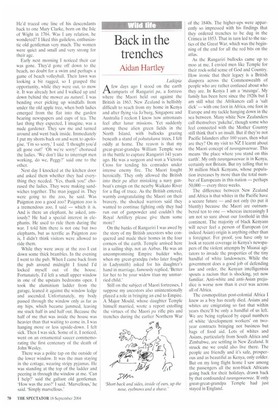Back in the trenches
Aidan Hartley
Laikipia A few days ago I stood on the earth TA.ramparts of Rangariri pa, a fortress where the Maori held out against the British in 1863. New Zealand is hellishly difficult to reach from my home in Kenya and after flying via Jo'burg, Singapore and Australia I reckon I know how astronauts feel after lunar missions. Yet suddenly among these alien green fields in the North Island, with bullocks grazing beneath a stand of pohutukawa trees, I felt oddly at home. The reason is that my great-great-grandpa William Temple was in the battle to capture Rangariri 141 years ago. He was a surgeon and won a Victoria Cross for tending his comrades under intense enemy fire. The Maori fought heroically. They only allowed the British into their pa after mistaking a navy gunboat's ensign on the nearby Waikato River for a flag of truce. As the British entered, warmly congratulating the Maori on their bravery, the shocked warriors said they wanted to continue fighting only they had run out of gunpowder and couldn't the Royal Artillery please give them some more?
On the banks of Rangariri I was awed by the story of my British ancestors who conquered and made their homes in the four corners of the earth. Temple arrived here in a sailing ship, not an Airbus. He was an uncompromising Empire builder who, when my great-grandpa (who later fought in Ladysmith) asked for his daughter's hand in marriage, famously replied, 'Better for her to be your widow than my unmarried child.'
Still on the subject of Maori fortresses, I suppose my ancestors also unintentionally played a role in bringing an end to Empire. A Major Mould, whose daughter Temple himself married, wrote a report extolling the virtues of the Maori pa rifle pits and trenches during the earlier Northern War
of the 1840s. The higher-ups were apparently so impressed with his findings that they ordered trenches to be dug in the Crimea in 1853. That in turn led to the tactics of the Great War, which was the beginning of the end for all the red bits on the atlas.
As the Rangariri bullocks came up to moo at me. I envied men like Temple for their rock-solid sense of God and Country. How ironic that their legacy is a British diaspora across the Commonwealth of people who are rather confused about who they are. In Kenya I am a `mzungu'. My family has been here since the 1920s but I am still what the Afrikaners call a 'salt dick' — with one foot in Africa, one foot in Europe and my tackle hanging down in the sea between. Many white New Zealanders call themselves ‘pakeha', though some who feel connected with the Mother Country still think that's an insult. But if they're not Pacific Islanders after 160 years, then what are they? On my visit to NZ I learnt about the Maori concept of turangawaewae. This means 'the place where you stand on this earth'. My only turangawaewae is in Kenya, certainly not Britain. But try telling that to 30 million black Kenyans, whose population increases by more than the total number of Europeans in this nation — perhaps 50,000 — every three weeks.
The difference between New Zealand and Africa is that whites in the Pacific have a secure future — and not only (to put it bluntly) because the Maori are outnumbered ten to one — whereas increasingly I am not so sure about our foothold in this continent. The majority of black Kenyans will never feel a person of European (or indeed Asian) origin is anything other than a foreigner. For proof, you have only to look at recent coverage in Kenya's newspapers of the violent attempts by Maasai agitators to invade the properties of the tiny handful of white landowners. While the government does a good job of defending law and order, the Kenyan intelligentsia spouts a racism that is shocking, yet now familiar. Anti-white and anti-Asian prejudice is worse now than it ever was across all of Africa.
The cosmopolitan post-colonial Africa I knew as a boy has nearly died. Asians and whites are emigrating so fast that within years there'll be only a handful of us left. We are being replaced by equal numbers of white 'development workers' on twoyear contracts bringing not business but bags of food aid. Lots of whites and Asians, particularly from South Africa and Zimbabwe, are settling in New Zealand. It struck me we could also live there. The people are friendly and it's safe, prosperous and as beautiful as Kenya, only colder. But on my long flight home I saw among the passengers all the non-black Africans going back for their holidays, drawn back by that confounded turangawaewae. If only great-great-grandpa Temple had just stayed in England.


















































































 Previous page
Previous page